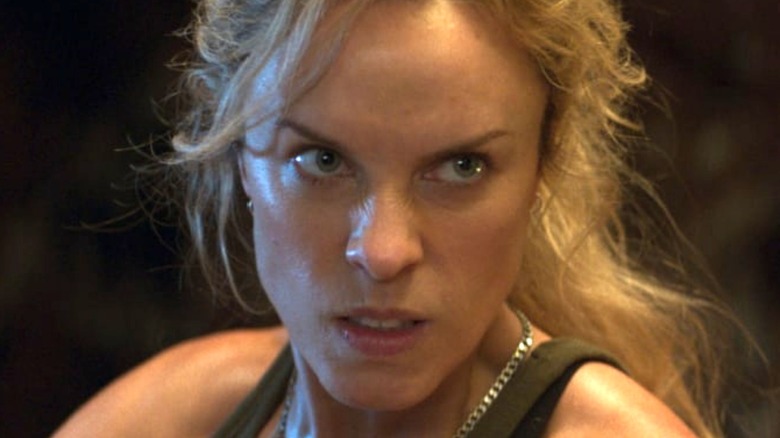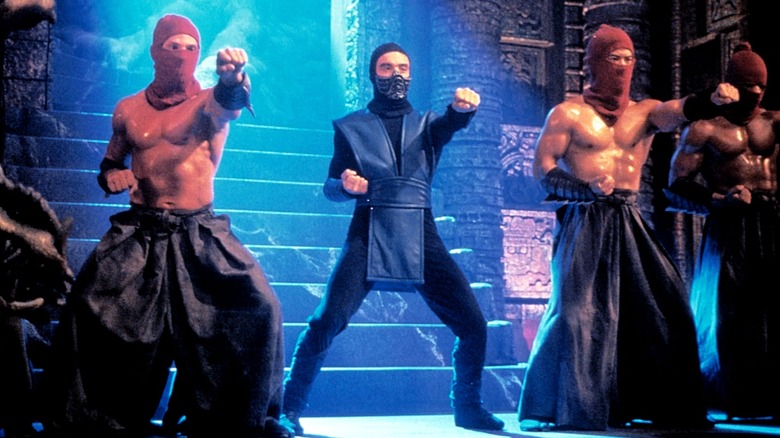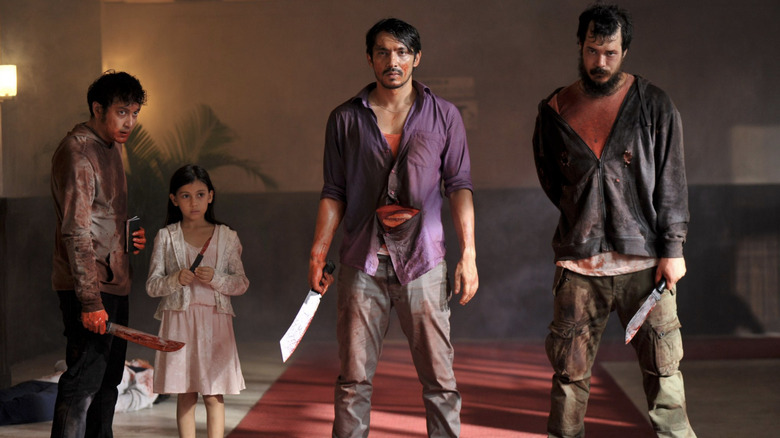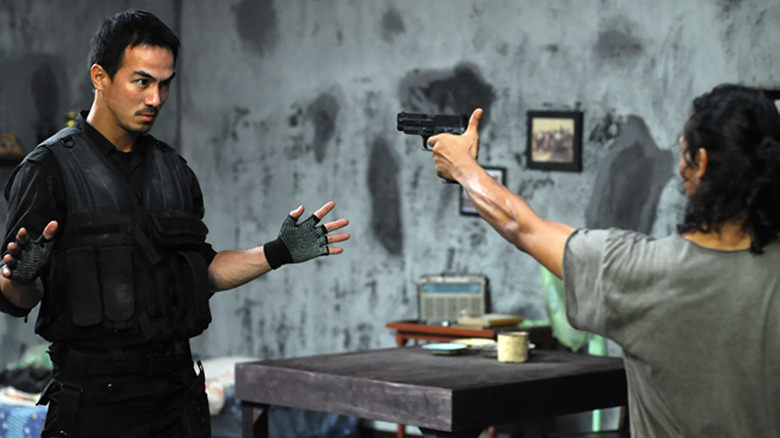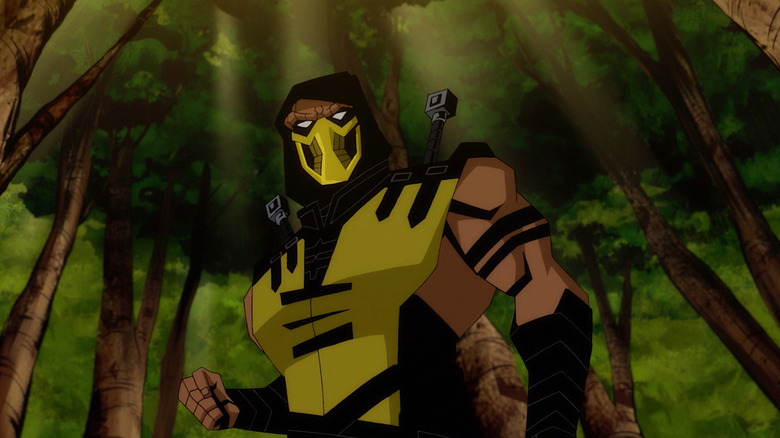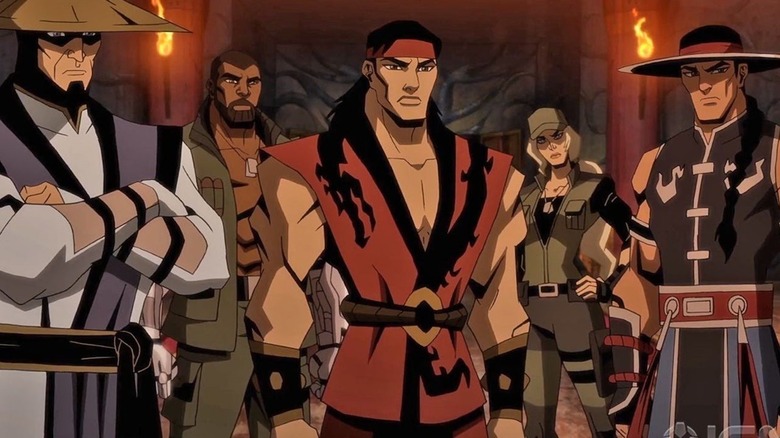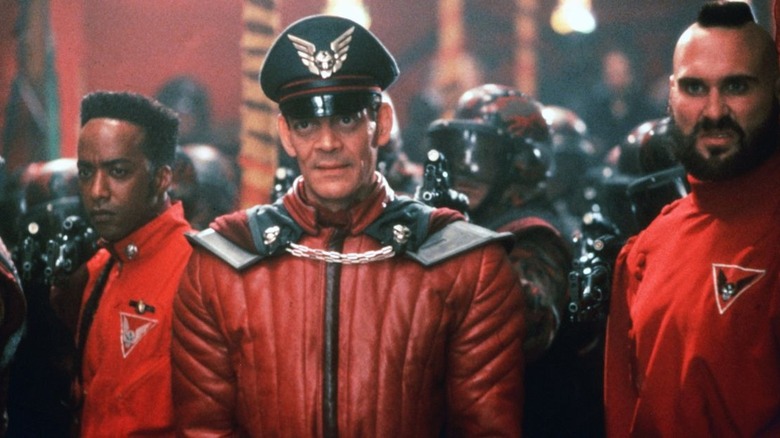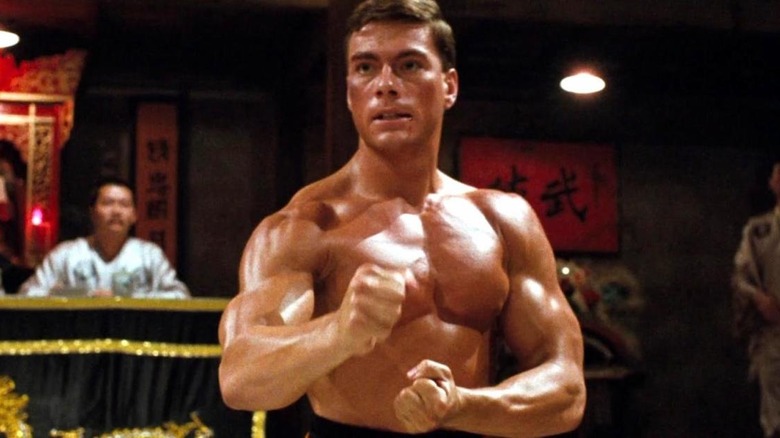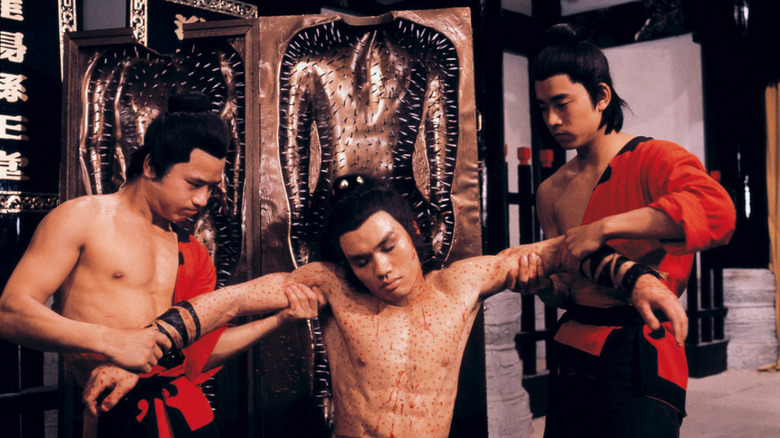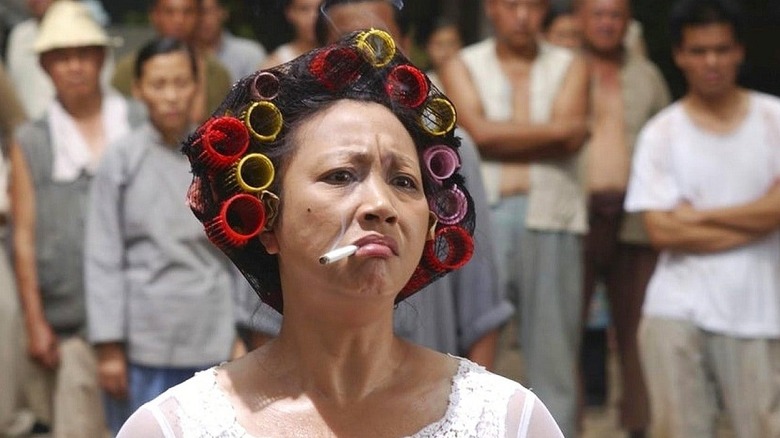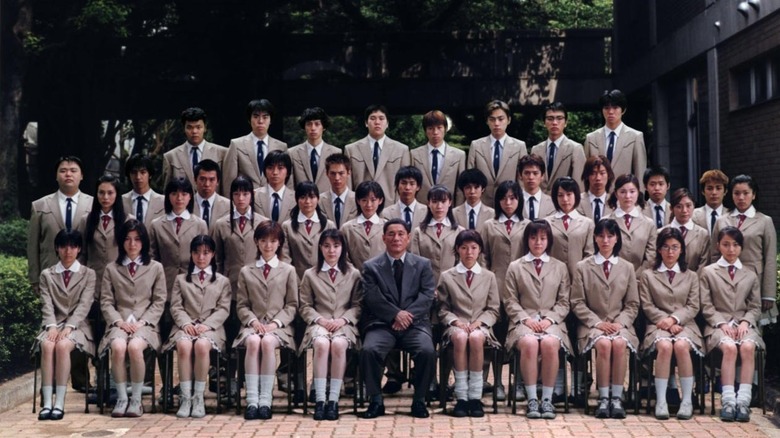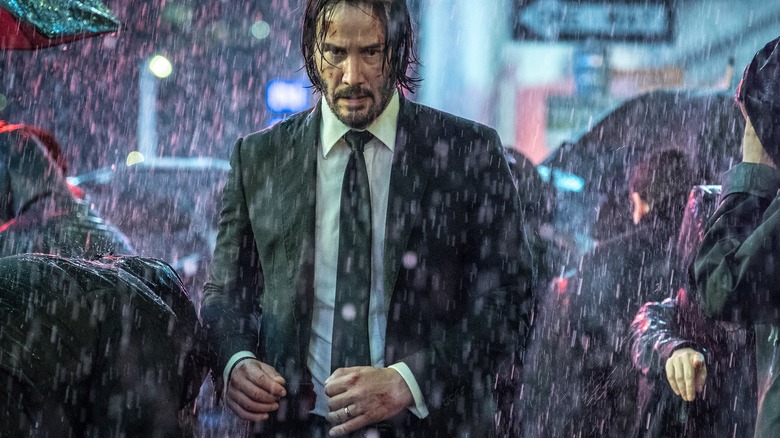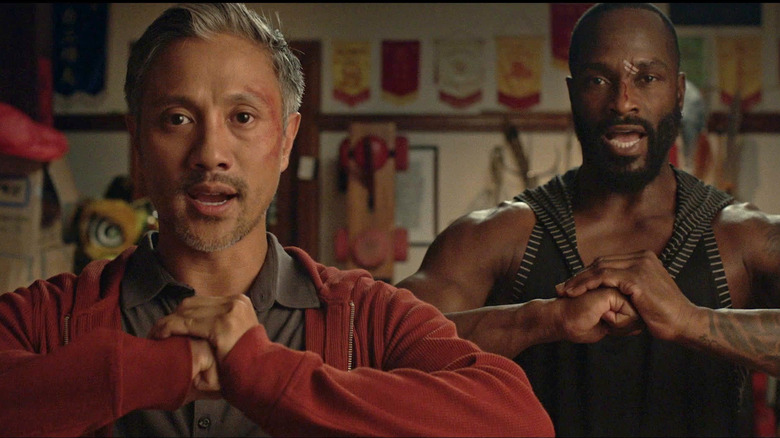12 Films You Should Watch If You Loved Mortal Kombat
To future generations, April 2021 will look like the strangest time capsule. Cryptopunks were selling at Sothebys. "Mare Of Easttown" had the nation saying "meust" and "deun't" instead of "most" or "don't." And movie theaters were sort of open, playing the same four or five movies ad nauseam. One of the month's top grossers? An adaptation of a video game franchise that launched in 1992 — and the internet was hype for it.
In many ways, Simon McQuaid's big-screen take on "Mortal Kombat" reminded me why we go to the movies. It's not always for art. Sometimes, you want to see a spear shot straight through a bevy of nameless bad guys on the largest screen possible; sometimes, you want to see a performance that doesn't run circles around the others so much as it burns them off the screen. "Mortal Kombat" is a glorious celebration of schlock as consumable ephemera, and if its hyper-violent fights, colorful world-building, and clumsy dialogue made your day, here are 12 other films to watch.
Mortal Kombat
I'm previously written about Paul W.S. Anderson's first video game film, but let me add the obvious: There is no "Mortal Kombat" reboot without it. Nor, I suspect, are there the "John Wick" films or an audience that's ready for the gleefully gonzo cinema of auteur James Wan. "Mortal Kombat" wasn't supposed to work. It was preceded by a misedited disaster and two critical failures; to say there were minimal expectations going in is putting it mildly. And yet, against all odds, its goofy and sincere butt-kicking exceeded those expectations and endured, paving the way for a more colorful strain of action film steeped in outrageous, glorious lore.
Though it's easy to see "Mortal Kombat" for the knowing, B-movie schlock it is today, also remember that, at the time, it was a New Line Cinema tentpole. "Mortal Kombat" released four months after "The Basketball Diaries" and "Friday" and one month before "Seven"; one of these films is not like the other. And yet, "Mortal Kombat" has endured despite all the trappings that might have sunk it. It could've been lost to home video purgatory, or stranded without a home as the industry shifts towards streaming. It wasn't. "Mortal Kombat" is martial arts cinema history. That alone makes it worthy of a rewatch, especially if you loved its reboot.
The Night Comes for Us
When "Mortal Kombat" debuted in arcades about 30 years ago, its violence was quickly criticized by politicians and critics alike. None of them, however, could have imagined a film like "The Night Comes for Us," which released on Netflix in 2018 and makes Midway Games' fighting game look like "Oliver & Company." And to paraphrase Billy Joel, you should worry about "The Night Comes for Us;" it has street savior-faire.
Those streets, of course, are caked in gore and blood. Directed by horror maestro Timo Tjahjanto, "The Night Comes for Us" marries that genre's specific penchant for viscera to the acrobatic fist-flinging of martial arts films, arriving at a uniquely violent endgame that doesn't take prisoners. In "Mortal Kombat" terms, this movie's fatalities have fatalities.
"The Night Comes for Us" gathers some of Thai cinema's finest fighting talents and both shows off their skills and dismembers them. More than any film on this list, it artfully rekindles the transgressive thrill audiences felt when they first encountered "Mortal Kombat," no matter what year (or decade) that was. It is must-see stuff that will scare both the politicians and the critics in your life.
The Raid
Like "Mortal Kombat," it's easy to imagine 2011's "The Raid" springing from a video game that became a cultural sensation. Unlike its awesome but higher-brow sequel, "The Raid" has a plot that, even by the most generous of descriptions, is in service of its cinematic gameplay: A top-tier squad of police officers is charged with capturing a sociopathic drug lord by infiltrating the slum he runs with an iron fist. Once inside, the drug lord orders everyone in the building to eliminate the cops by any means necessary. Mayhem ensues.
Each one of the set pieces in "The Raid" feels like a level in which the heroes race towards the big boss, and the cumulative effect of having those battles stacked on top of one another (and populating them with action and martial arts mainstays like Iko Uwais and Joe Taslim) is a film that feels like it almost necessitates save points, or at least moments to catch one's breath. If the relentless, deadly action is what appeals to you most about 2021's "Mortal Kombat," "The Raid" should be the first film you watch from this list.
Mortal Kombat Legends: Scorpion's Revenge
If you didn't know it from the pre-film stinger in "Mortal Kombat Legends: Scorpion's Revenge," which sees Scorpion choke-slamming a very manic Daffy Duck, Ethan Spaulding's animated film has a wicked sense of humor that allays its frequent bloodshed. Make no mistake, however: The bloodshed is not to be trifled with. If the extreme eviscerations of "Mortal Kombat" are the film's primary draw, then "Scorpion's Revenge" will both honor and test that affection; put another way, it's almost surprising that Amazon Prime's "Invincible" jump-started a conversation about violence in animation, when "Scorpion's Revenge" brutally murdered Satoshi's son a year earlier.
"Scorion's Revenge" not all violent theatrics, though. "Mortal Kombat Legends: Scorpion's Revenge" is blessed with a bevy of satisfying vocal performances that elevate its paper-thin characters. Joel McHale is the Johnny Cage that Mortal Kombat fans have deserved for almost three decades, while Kevin Michael Richardson adds his usual but always-effective gravitas to the four-armed Goro. "Scorpion's Revenge" is as much a violent exercise as it is movie, but it's so deliberately joyful in its approach that it's hard to argue against it. Plus: Unlike 2022's "Mortal Kombat," it has a tournament. As does its sequel...
Mortal Kombat Legends: Battle of the Realms
If we're being honest, "Mortal Kombat Legends: Battle of the Realms" is almost entirely for completists. Where "Mortal Kombat: Scorpion's Revenge" anchors its story in the origin and vengeance of Hanzo "Scorpion" Hasashi, "Battle of the Realms" tethers itself to an entire cast of ne'er-do-wells and fighters. Liu Kang takes on the cyber initiative! Kuai Liang wants vengeance for his brother's passing! And we haven't even gotten to Outworld's invasion of Earthrealm, which is theoretically the main thrust of the movie.
If "Mortal Kombat: Battle of the Realms" sounds overly busy, it is. That said, it's careening and whiplash-inducing plot is actually truer to the spirit of the labyrinthine story beats that define the later "Mortal Kombat" games; if you already have a passion for said games, their wide range of characters is fervently recreated here. The animated fight choreography is undeniably impressive, somehow bolstering the film's horrifying creativity when it comes to limb shattering. Go in with low expectations, or think of "Battle of the Realms" as a bridge between "Scorpion's Revenge" and future installments, and you won't emerge disappointed.
Street Fighter
There isn't a lot to recommend about 1994's "Street Fighter." It's mostly a pretty strange mess. That said, it's a pretty strange mess that has Raul Julia playing M. Bison.
Raul Julia died shortly after "Street Fighter" was released. He made "Street Fighter" for his children. I think about both these facts more often than one might expect, because when they're coupled with Julia's performance in "Street Fighter," they are a symphony that rips at the heartstrings. Bison is, both literally and metaphorically, acting to save his life. Julia's work has all the knowing, go-for-broke energy of a performer who's aware that his time on the stage of life is ending.
Raul Julia, Juilliard graduate, studied real life megalomaniac world leaders to play a guy who would chew scenery even if he had no teeth left. We're told that the ends don't justify the means, but Julia's means are so infused with undeniable life that they make one want to clap back "don't they?" This is a career-defining performance in a movie with little definition. This is, for the last time, Raul Julia — movie star.
Bloodsport
There are many downsides to aging, but one of the more pervasive is discovering that the pop-culture ephemera you grew up with is leaving society's collective consciousness. Disney Adventures Magazine. The AOL dial-up tone. And, in no way least of all, Jean Claude Van Damme's all-time action effort, "Bloodsport."
Released in 1988, "Bloodsport" is the film that made JCVD a star. Though he would go on to star in larger and higher-grossing movies, few were a more impeccable showcase for his physical talents. The eye-popping footwork. The cinematic physique. They were the movie's aces in the hole, and ones that "Bloodsport" used with the abandon of a player down on chips. That the film sports a young Forest Whitaker and not-Grammy-nominated anthems performed by Paul Delph is just icing on the cake.
Most importantly, "Bloodsport" is the movie that makes both the "Mortal Kombat" movie and the games possible ("Bloodsport" was even used to pitch the original game). It has the flimsiest of stories. Its main attraction is a tournament. And its box office exceeded its budget by more than 20 times over. If "Bloodsport" didn't pave the way for the fighting game boom (it was released four years before the first "Mortal Kombat" came out), then it almost certainly lit the path. That makes it history worth knowing.
Five Deadly Venoms
The Shaw brothers' body of work is the root of most modern martial arts films. "Shang-Chi" borrows from the duo's ecstatic and thrilling wire work; "John Wick," their absurdism and ability to shift between brutality and comedy. So, while it's as easy as breathing to say that the Shaw brothers influenced 2021's "Mortal Kombat" and you should watch one of their films if you enjoyed it, you still need to know which one. Predictably, the answer is as obvious as the question.
1978's "Five Deadly Venoms" has a bad guy named Scorpion. It also has a bad guy named Lizard, which is synonymous with Reptile. Its characters wear incredible and intricate masks and headgear, and perform what might be described as special moves. "Five Deadly Venoms" was "Mortal Kombat" before "Mortal Kombat" existed. It's essential viewing if you love the property in any way, shape, or form.
Kung Fu Hustle
In some ways, Stephen Chow is the natural successor to the Shaw brothers. Both are from Hong Kong; both are partial to martial arts-heavy genre-bending exercises that favor magical realism over boring stuff like gravity and logic. The primary difference between them is one of tone. The Shaw brothers' films maintain an inherent sense of dignity, even as some wackiness encroaches. Stephen Chow's films, though, are never worried about composure. As the Looney Tunes have proved for over 90 years, dignity is overrated.
"Kung Fu Hustle," in particular, understands and expounds on this. There's no shortage of Wile E. Coyote and Roadrunner-like one-upmanship to its frequently madcap fights. Some are accented with "pew pew" sound effects. Others feature random, sunset-accentuated pratfalls. "Kung Fu Hustle," like 2021's "Mortal Kombat," understands that, if its characters primarily exist to smash each other senselessly, they should be able to make us laugh as they're doing so, if necessary.
Battle Royale
Fights in films are rarely fun simply because people are fighting. For a fight to sing, there must be more than violence — there must be conflict. Even if the stakes are slight, their existence is a four-course meal for the right combatants and choreographers. So, it figures that "Battle Royale" is not only a classic manga, but one of the greatest action films of the past 20 years: it has all-time great stakes.
A high-school class embarks on a field trip when, without warning, the students are gassed and taken to a remote island. They awake wearing explosive collars; as part of an annual Battle Royale, they now have three days to fight to the death until one student emerges victorious. And if the students don't engage with their killer instincts, those collars will kill them. The best part? Most of this is conveyed in the opening scrawl.
Has a premise ever taken its characters from zero to murderous more swiftly? Even better, unlike 2021's "Mortal Kombat," "Battle Royale" finds time to take a break from the bloodshed to reflect on social anxieties, especially the ways that adults pass down their histories with violence onto their children. "Battle Royale" may hinge on its intro, but its thematic layers and terrific execution are what make it a must-watch.
John Wick: Chapter 3 – Parabellum
There's little argument that Chad Stahalski, David Leitch, and Derek Kolstad's "John Wick" films represent the pinnacle of modern American action cinema. Each subsequent installment aims to outdo the last by dizzying degrees, whether it's through putting motorcycle-riding bad guys against Keanu Reeves on a horse or making a new subset of New York's population an asset to assassins. Fans of "Mortal Kombat" should enjoy any installment of the Wick trilogy. They're that consistent and thrilling.
For my money, though, it's "John Wick: Chapter 3" that is the finest offering for those who enjoyed Simon McQuaid's film. It has the series' most wicked brawls. It treats more than one character to an unfathomably violent outcome. And, like both the "Mortal Kombat" films and games, it is deeply steeped in ridiculous lore. The mythos of the "John Wick" films has emerged as one of its most endearing elements, and the lengths to which "Parabellum" spins it almost ensure that John Wick will fight the champions of the NetherRealm in "John Wick 5" — and, probably, win.
The Paper Tigers
There are, happily, a number of strong contenders for 2021's best action film: Bob Odenkirk's tremendous, John Wick-adjacent "Nobody"; Guy Ritchie's shockingly grim "Wrath of Man"; and, most unlikely, Quoc Bao Tran's "The Paper Tigers."
In some ways, "The Paper Tigers" is the least "Mortal Kombat"-like movie on this list. It's deeply grounded in the real world, one in which martial artists far from their prime reunite during middle age and pull muscles mid-fight. There's a weight and cost to the violence that, while funny, never prioritizes the bone breaks over the way loss breaks hearts. When "The Paper Tigers" marries that weight to its gorgeously choreographed fights, this scrappy film becomes an underdog that not only comes through in the clutch, but lays waste to the competition.
In that sense, "The Paper Tigers" is what "The Karate Kid" promised by way of "Cobra Kai." And, in playing to our childhood and adult sensibilities simultaneously, it becomes essential viewing for anyone who grew up — or is growing up — with "Mortal Kombat."
